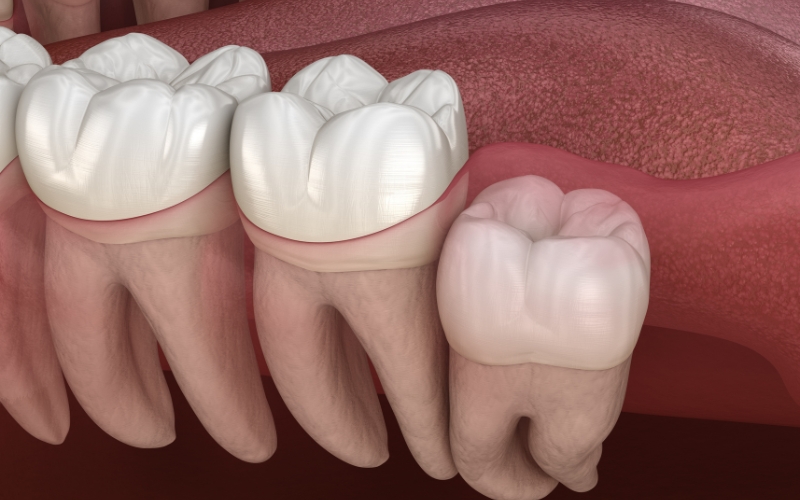same day emergency appointments available
What Can I Eat After Wisdom Teeth Extraction?

Wisdom teeth extraction is a standard dental procedure many people undergo during their lifetime. While it can alleviate pain and discomfort caused by impacted or problematic wisdom teeth, the recovery process requires careful attention, especially regarding your diet.
In this blog, we’ll explore the importance of a proper post-extraction diet, the types of dental sedation available, and provide a detailed guide on foods to eat and avoid during wisdom teeth extraction recovery.
Whether you’ve just had your wisdom teeth removed or are planning for the procedure, this information will help you navigate this crucial aspect of your recovery journey.
Importance of Proper Post-Extraction Diet
Your diet plays a vital role in the healing process after wisdom teeth extraction. A well-balanced diet ensures that your body receives the necessary nutrients to promote tissue repair and reduce the risk of infection.
The right foods can also help minimize discomfort and swelling while preventing complications from consuming improper foods.
Diet for the First 24 Hours
Immediately after your wisdom teeth extraction, your focus should be on maintaining proper oral hygiene and minimizing the risk of infection.
During the first 24 hours, it’s advisable to stick to a liquid or soft food diet to avoid disturbing the surgical site. Here’s a list of suitable options:
– Cold soups like chicken or vegetable broth
– Smoothies or milkshakes (avoid using straws, as they can dislodge blood clots)
– Yogurt or pudding
– Applesauce
– Mashed potatoes or sweet potatoes
– Scrambled eggs (soft-cooked)
– Ice cream (in moderation)
Foods You Can Eat After Wisdom Teeth Removal
As you progress through the initial recovery phase, you can gradually introduce more solid foods into your diet. Soft foods that require minimal chewing are ideal to prevent irritation or damage to the surgical area. Consider the following options:
1. Cooked and mashed vegetables, such as carrots or peas.
2. Soft pasta dishes like macaroni and cheese.
3. Oatmeal or porridge.
4. Steamed or poached fish.
5. Soft fruits like bananas or avocados.
6. Tofu or soft chicken.
7. Rice, quinoa, or couscous.
These foods are gentle on your healing gums and provide the essential nutrients your body needs for a smooth recovery.
Foods That You Should Avoid After the Surgery
While knowing what you can eat after wisdom teeth extraction is crucial, it’s equally important to be aware of foods that should be avoided during recovery. Steer clear of the following items, as they can hinder the healing process and increase the risk of complications:
1. Crunchy or hard foods: Nuts, chips, and raw vegetables can irritate the surgical site and even dislodge blood clots.
2. Spicy and acidic: These foods can cause discomfort and potentially irritate the healing area.
3. Hot beverages: Scalding liquids can disrupt blood clot formation and damage tissues.
4. Alcoholic beverages: Alcohol can interfere with healing and should be avoided during recovery.
5. Carbonated drinks: Soda bubbles can be uncomfortable and increase the risk of complications.
6. Foods with tiny seeds: Poppy seeds, sesame seeds, and the like can get lodged in the surgical site, leading to infection.
7. Chewy or sticky foods: Caramels, taffy, and gum can pull at stitches and disrupt healing.
Tips for Comfort and Healing
In addition to following a proper post-extraction diet, here are some tips to help you achieve a comfortable and speedy recovery:
1. Follow your dentist’s or oral surgeon’s post-operative instructions diligently.
2. Take prescribed pain medications as directed.
3. Apply ice packs to reduce swelling during the first 48 hours.
4. Maintain good oral hygiene by gently rinsing your mouth with warm saltwater after meals.
5. Get plenty of rest to aid the healing process.
6. Avoid strenuous physical activity for the first few days.
7. Stay hydrated by drinking plenty of water (avoid using straws).
A well-planned diet is essential for a successful and comfortable wisdom teeth extraction recovery. Remember to follow your dentist’s or oral surgeon’s recommendations closely and prioritize soft, nourishing foods to promote healing.
If you have any concerns or questions about your recovery process, please get in touch with Spring Valley Dental Care or your healthcare provider for guidance. By taking proper care of yourself and your diet, you can look forward to a smooth and speedy recovery after wisdom teeth extraction.




 Back
Back